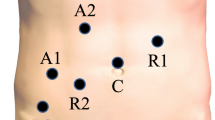Abstract
Background
Lateral pelvic lymph node dissection (LLND) combined with removal of the internal iliac vessels is a challenging surgical procedure in minimally invasive surgery. We herein report our dissection approach and short-term outcomes.
Methods
We conducted a study on rectal cancer patients who underwent laparoscopuic LLND combined with removal of the internal iliac vessels at our institution in March 2017–December 2019. In performing the surgery, we identified and dissected along the three pelvic sidewall fasciae (ureterohypogastric, umbilical prevesical and parietal pelvic fascia), located the internal ilial vein at the level of the common iliac vessels and carried out our dissection along the medial anterior surface of the internal iliac before transecting the vein. The duration of LLND was recorded as was the blood loss.
Results
There were 16 patients (10 males, mean age 65.4 ± 10.8 years). Five patients had primary surgery, and 11 had surgery for recurrence. The median blood loss of LLND was 10 ml (range, 0–250 ml), the median operating time was 173 min (range, 65–358 min), and post-operative complications were relatively mild. Seven of 16 patients (43.8%) were diagnosed with positive lateral nodes. The 2-year local recurrence-free and disease-free survival rates were 87.5% and 58.0%.
Conclusion
Recognizing the pelvic anatomical points illustrated in the present study contributes to the surgical safety of LLND combined with removal of the internal iliac vessels.




Similar content being viewed by others
Code availability
None.
References
Ogura A, Konishi T, Cunningham C, Garcia-Aguilar J, Iversen H, Toda S, Lee IK, Lee HX, Uehara K, Lee P, Putter H, van de Velde CJH, Beets GL, Rutten HJT, Kusters M; Lateral Node Study Consortium (2019) Neoadjuvant (chemo)radiotherapy with total mesorectal excision only is not sufficient to prevent lateral local recurrence in enlarged nodes: results of the multicenter lateral node study of patients with low ct3/4 rectal cancer. J Clin Oncol 37:33–43
Malakorn S, Yang Y, Bednarski BK, Kaur H, You YN, Holliday EB, Dasari A, Skibber JM, Rodriguez-Bigas MA, Chang GJ (2019) Who should get lateral pelvic lymph node dissection after neoadjuvant chemoradiation? Dis Colon Rectum 62:1158–1166
Ishihara S, Kawai K, Tanaka T, Kiyomatsu T, Hata K, Nozawa H, Morikawa T, Watanabe T (2017) Oncological outcomes of lateral pelvic lymph node metastasis in rectal cancer treated with preoperative. Chemoradiotherapy 60:469–476
Perez RO, São Julião GP, Vailati BB, Fernandez LM, Mattacheo AE, Konishi T (2018) Lateral node dissection in rectal cancer in the era of minimally invasive surgery: a step-by-step description for the surgeon unacquainted with this complex procedure with the use of the laparoscopic approach. Dis Colon Rectum 2018(61):1237–1240
Kawada K, Yoshitomi M, Inamoto S, Sakai Y (2019) Indocyanine green fluorescence-guided laparoscopic lateral lymph node dissection for rectal cancer. Dis Colon Rectum 62:1401
Malakorn S, Ouchi A, Sammour T, Bednarski BK, Chang GJ (2018) Robotic lateral pelvic lymph node dissection after neoadjuvant chemoradiation: view from the West. Dis Colon Rectum 61:1119–1120
Japanese Society for Cancer of the Colon and Rectum: General Rules for Clinical and Pathological Studies on Cancer of the Colon, Rectum, and Anus (9 th edn). Tokyo, Kanehara Shuppan, 2018.
Hajibandeh S, Hajibandeh S, Matthews J, Palmer L, Maw A (2020) Meta-analysis of survival and functional outcomes after total mesorectal excision with or without lateral pelvic lymph node dissection in rectal cancer surgery. Surgery S0039–6060(20):30282–30288
Ito M, Kobayashi A, Fujita S, Mizusawa J, Kanemitsu Y et al (2018) Urinary dysfunction after rectal cancer surgery: results from a randomized trial comparing mesorectal excision with and without lateral lymph node dissection for clinical stage II or III lower rectal cancer (Japan Clinical Oncology Group Study, JCOG0212. Eur J Surg Oncol 44:463–468
Funding
None.
Author information
Authors and Affiliations
Corresponding author
Ethics declarations
Conflict of interest
None.
Ethics approval
Ethics committee approval from our institution was obtained.
Consent to participate
Consent to participate from each patient was obtained.
Consent for publication
Consent for publication was obtained.
Availability of data and material
The datasets during and/or analyzed during the current study available from the corresponding author on reasonable request.
Additional information
Publisher's Note
Springer Nature remains neutral with regard to jurisdictional claims in published maps and institutional affiliations.
Supplementary Information
Below is the link to the electronic supplementary material.
Supplementary file1 (MP4 163028 KB)
Rights and permissions
About this article
Cite this article
Beppu, N., Jihyung, S., Takenaka, Y. et al. Laparoscopic lateral pelvic lymph node dissection combined with removal of the internal iliac vessels in rectal cancer: how to standardize this surgical procedure. Tech Coloproctol 25, 579–587 (2021). https://doi.org/10.1007/s10151-020-02387-3
Received:
Accepted:
Published:
Issue Date:
DOI: https://doi.org/10.1007/s10151-020-02387-3



